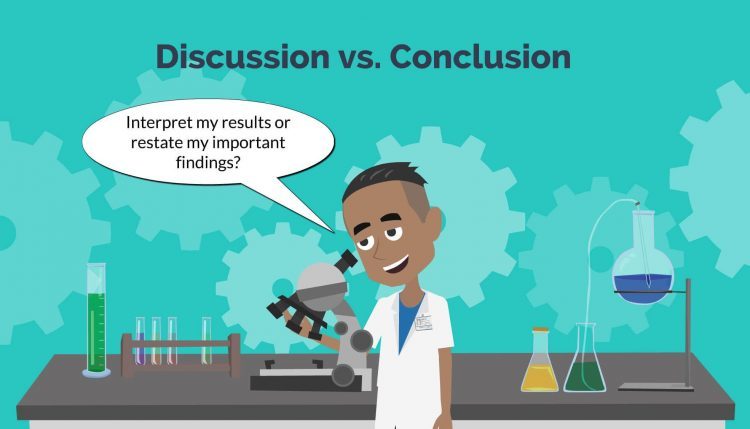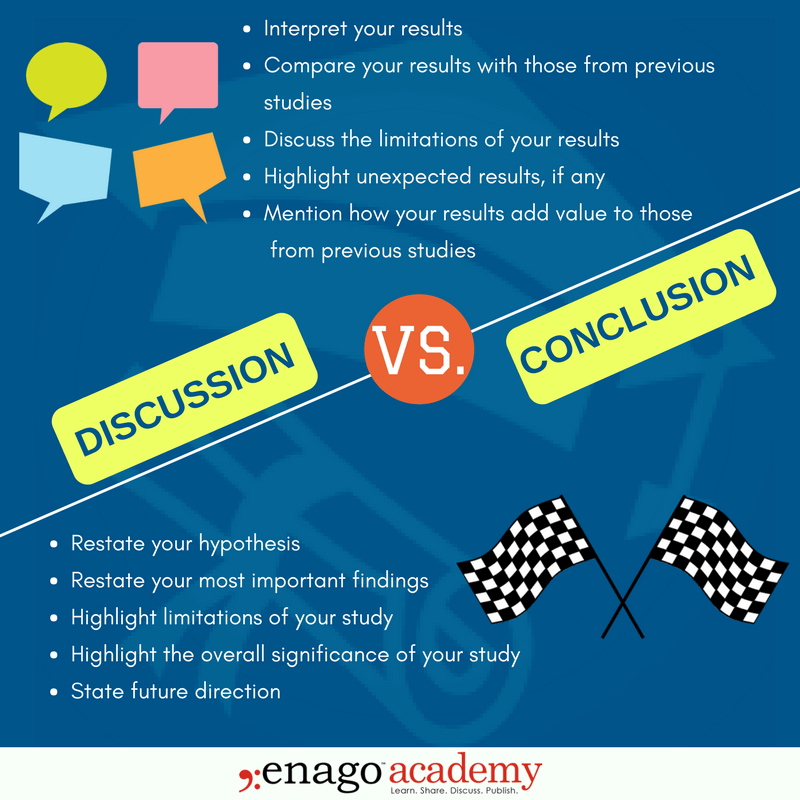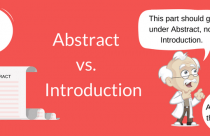Discussion Vs. Conclusion: Know the Difference Before Drafting Manuscripts

The discussion section of your manuscript can be one of the hardest to write as it requires you to think about the meaning of the research you have done. An effective discussion section tells the reader what your study means and why it is important. In this article, we will cover some pointers for writing clear/well-organized discussion and conclusion sections and discuss what should NOT be a part of these sections.
What Should be in the Discussion Section?
Your discussion is, in short, the answer to the question “what do my results mean?” The discussion section of the manuscript should come after the methods and results section and before the conclusion. It should relate back directly to the questions posed in your introduction, and contextualize your results within the literature you have covered in your literature review. In order to make your discussion section engaging, you should include the following information:
- The major findings of your study
- The meaning of those findings
- How these findings relate to what others have done
- Limitations of your findings
- An explanation for any surprising, unexpected, or inconclusive results
- Suggestions for further research
Your discussion should NOT include any of the following information:
- New results or data not presented previously in the paper
- Unwarranted speculation
- Tangential issues
- Conclusions not supported by your data
Related: Avoid outright rejection with a well-structured manuscript. Check out these resources and improve your manuscript now!
How to Make the Discussion Section Effective?
There are several ways to make the discussion section of your manuscript effective, interesting, and relevant. Hear from one of our experts on how to structure your discussion section and distinguish it from the results section:
Now that we have listened to how to approach writing a discussion section, let’s delve deeper into some essential tips with a few examples:
- Most writing guides recommend listing the findings of your study in decreasing order of their importance. You would not want your reader to lose sight of the key results that you found. Therefore, put the most important finding front and center.
Example: Imagine that you conduct a study aimed at evaluating the effectiveness of stent placement in patients with partially blocked arteries. You find that despite this being a common first-line treatment, stents are not effective for patients with partially blocked arteries. The study also discovers that patients treated with a stent tend to develop asthma at slightly higher rates than those who receive no such treatment.
Which sentence would you choose to begin your discussion?
Our findings suggest that patients who had partially blocked arteries and were treated with a stent as the first line of intervention had no better outcomes than patients who were not given any surgical treatments.
Our findings noted that patients who received stents demonstrated slightly higher rates of asthma than those who did not. In addition, the placement of a stent did not impact their rates of cardiac events in a statistically significant way.
If you chose the first example, you are correct!
- If you are not sure which results are the most important, go back to your research question and start from there. The most important result is the one that answers your research question.
- It is also necessary to contextualize the meaning of your findings for the reader. What does previous literature say, and do your results agree? Do your results elaborate on previous findings, or differ significantly?
- In our stent example, if previous literature found that stents were an effective line of treatment for patients with partially blocked arteries, you should explore why your interpretation seems different in the discussion section. Did your methodology differ? Was your study broader in scope and larger in scale than the previous studies? Were there any limitations to previous studies that your study overcame? Alternatively, is it possible that your own study could be incorrect because of some difficulties you had in carrying it out? The discussion section should narrate a coherent story to the target audience.
- Finally, remember not to introduce new ideas/data, or speculate wildly on the possible future implications of your study in the discussion section. However, considering alternative explanations for your results is encouraged.

Avoiding Confusion in your Conclusion!
Many writers confuse the information they should include in their discussion with the information they should place in their conclusion. One easy way to avoid this confusion is to think of your conclusion as a summary of everything that you have said thus far. In the conclusion section, you remind the reader of what they have just read. Your conclusion should:
- Restate your hypothesis or research question
- Restate your major findings
- Tell the reader what contribution your study has made to the existing literature
- Highlight any limitations of your study
- State future directions for research/recommendations
Your conclusion should NOT:
- Introduce new arguments
- Introduce new data
- Fail to include your research question
- Fail to state your major results
An appropriate conclusion to our hypothetical stent study might read as follows:
In this study, we examined the effectiveness of stent placement. We compared the patients with partially blocked arteries to those with non-surgical interventions. After examining the five-year medical outcomes of 19,457 patients in the Greater Dallas area, our statistical analysis concluded that the placement of a stent resulted in outcomes that were no better than non-surgical interventions such as diet and exercise. Although previous findings indicated that stent placement improved patient outcomes, our study followed a greater number of patients than those in major studies conducted previously. It is possible that outcomes would vary if measured over a ten or fifteen year period. Future researchers should consider investigating the impact of stent placement in these patients over a longer period (five years or longer). Regardless, our results point to the need for medical practitioners to reconsider the placement of a stent as the first line of treatment as non-surgical interventions may have equally positive outcomes for patients.
Did you find the tips in this article relevant? What is the most challenging portion of a research paper for you to write? Let us know in the comments section below!










This is the most stunning and self-instructional site I have come across. Thank you so much for your updates!
I will help me work on my dissertation.
Thank you so much!! It helps a lot!
very helpful, thank you
thanks a lot …
this is one of a kind! awesome, straight to the point and easy to understand! Thanks a lot
Thank you so much for this, I never comment on these types of sites but I just had too here as I’ve never seen an article that has answered everyone of the questions I wanted when I searched on Google. Certainly not to the extent and clear clarity that you have presented. Thanks so much for this it has put my mind to ease a bit with my terrible dissertation haha.
Have a nice day.
Helped massively with writing a good conclusion!
Extremely well explained all details in simple and applicable manner,
Thank you very much for outstanding article.
It really made life easy.
Ravi, India.
Thanks a lot for such a nicely explained difference of discussion and conclusion. now got some basic idea to write what.
Thanks for clearing the great confusion. It gave real clarity to me!
Clarified my confusion. Thank you for this article
This website certainly has all of the information I wanted concerning this subject and didn’t know who to ask.